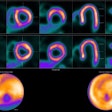Dear AuntMinnie Member,
A pair of new studies out this week indicates that even low doses of radiation -- such as those delivered during medical imaging studies -- are likely to increase a person's risk of developing cancer. The studies once again shine a spotlight on the Achilles heel of radiation-based imaging technologies, and have prompted radiology advocates to issue statements defending the safety of modalities like CT.
In a report released yesterday, a National Academy of Sciences panel said that it's unlikely that there is a threshold of radiation below which cancers are not induced. The panel said it believes that cancer risk is cumulative over a person's lifetime as radiation exposure increases. That story is available here.
The second study examined nuclear industry workers in 15 countries who had been exposed to low doses of radiation over an extended period of time, finding that these workers had a higher risk of cancer death. You can view this story here.
The studies can be seen as a refutation of the emerging theory of radiation hormesis -- that extremely low doses of radiation are not harmful, and in fact could be beneficial. Not coincidentally, researchers with both study groups specifically addressed this debate in discussing their results, which they said supported the linear no-threshold (LNT) theory: that there is no safe level of radiation dose.
The National Academy of Sciences researchers went a step further, stating that their results indicate that one person out of 1,000 would develop cancer from a radiation dose of 10 millisievert (mSv), the average radiation dose in a single whole-body CT scan.
What impact will the studies have on public perceptions of radiation-based imaging? Only time will tell, but the lay press and pundits are already using the NAS study to cast aspersions on whole-body CT screening, which has had a hard enough time of late in demonstrating its value. This week's studies didn't do the movement any favors.
Read all about our coverage of these important new studies in our X-Ray Digital Community, at xray.auntminnie.com.















